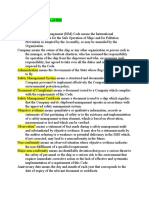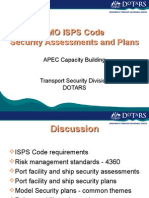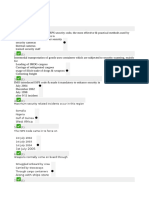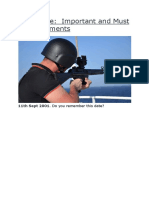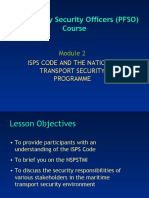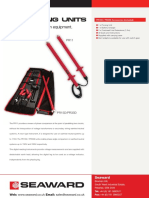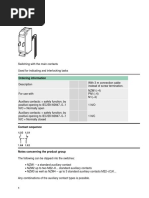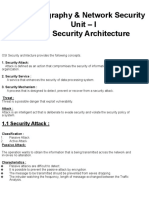Isps Code
Isps Code
Uploaded by
Okey OkoliCopyright:
Available Formats
Isps Code
Isps Code
Uploaded by
Okey OkoliOriginal Title
Copyright
Available Formats
Share this document
Did you find this document useful?
Is this content inappropriate?
Copyright:
Available Formats
Isps Code
Isps Code
Uploaded by
Okey OkoliCopyright:
Available Formats
INTERNATIONAL SHIP AND PORT FACILITY SECURITY (ISPS) CODE ISPS
The International Ship and Port Facility Security (ISPS) Code is an amendment to
the Safety of Life at Sea (SOLAS) Convention (1974/1988) on minimum security
arrangements for ships, ports and government agencies. Having come into force in 2004,
it prescribes responsibilities to governments, shipping companies, shipboard personnel,
and port/facility personnel to "detect security threats and take preventative measures
against security incidents affecting ships or port facilities used in international trade
The ISPS code was implemented by IMO on July 1 st 2004 as the comprehensive set of
measure for international security by prescribing responsibilities to government
authority, port authority, shipping companies and seafarers.
Main Aim of ISPS code
To control the access of unauthorized person on board and inside any port.
To monitor the activity of people and cargo operation. To detect the different
security threats on board vessel and in port and implement measure as per the
situation.
To provide security level to the ship and derive various duties and functions in
different security level.
To build and implement roles and responsibilities for port state officer and on
board officers to tackle maritime security threat at international level.
To collect data from all over the world concerning security threats and results to
tackle the same.
ISPS CODE FOR VESSELS INCLUDES :
Company Security Officer ( CSO )
CSO is a company appointed person who is responsible for the ship security
assessment and for on board survey to confirm the development and implementation of
ship security plan as per ISPS code. If any deficiency occurs, CSO is responsible to
deal with all the non-conformities and to modify SSP as per the deficiency.
Ship Security Officer ( SSO )
SSO is the in charge of security of the vessel on board and responsible for the other
entire crew member to carry out duties for ship security as per ISPS code. SSO is
responsible for carrying out frequent drills for ISPS Code as per SSP.
Ship Security Plan ( SSP )
It is a plan kept on board vessel mentioning the duty of crew members at different
security levels and the do’s and don’ts at different type of security threats. SSO is
responsible under CSO to implement ship security plan onboard vessel.
Ship Security Alert System
Different types of security equipment are kept on board which includes metal detector
for checking the person entering the vessel. From July 2004, most of the ship has
installed Ship Security Alert System (SSAS) as per ISPS norms which does not sound
on ship but alarms the shore authority about the security threat.
Implementing Security Level
It’s the responsibility of SSO to implement the security level on board complying with the
security level set by the local government authorities. Also a continuous response is to
be made to Port state when security level is level 3.
ISPS CODE FOR PORT FACILITIES INCLUDES
Port facility Security Officer ( PFSO )
PFSO is Government appointed officer responsible for implementing PFSP and to
derive security levels for port and vessel berthing at their jetty. He is responsible to
conduct port facility security assessment.
Port Facility Security Plan ( PFSP )
It includes the plans and action to be taken at different security levels. Roles and
responsibilities are included in PFSP. Action to be taken at the time of any security
breach is described in PFSP.
Security Equipments
Minimum security equipment like scanner and metal detector etc must be available at all
time with port facility to avoid breach of security inside the port.
Implementing Security Level
Security levels are implemented by port authority under the consult of local government
authority. The security level adopted for port facility must be informed to vessel
administration for cooperative measures.
You might also like
- The ISPS CodeDocument10 pagesThe ISPS CodesibinmgNo ratings yet
- ISPS Code Awareness Training Rev 2aDocument66 pagesISPS Code Awareness Training Rev 2aAiman Ilham100% (21)
- Company and Ship Security Plan TrailDocument130 pagesCompany and Ship Security Plan Traillegaspiriojr100% (1)
- The International Ship and Port Facility Security (ISPS) CodeDocument9 pagesThe International Ship and Port Facility Security (ISPS) CodeOskr Mauricio Valdelamar CamachoNo ratings yet
- Iso 27001 PDFDocument7 pagesIso 27001 PDFMonica MoreiraNo ratings yet
- ISPS Code: The 9/11 After Effect: by - In:, - Last Updated On November 19, 2016Document3 pagesISPS Code: The 9/11 After Effect: by - In:, - Last Updated On November 19, 2016Abraham Immanuel AdamNo ratings yet
- The ISPS Code For Ships-QUICK GUIDEDocument6 pagesThe ISPS Code For Ships-QUICK GUIDEPaulici Paul100% (1)
- ISPSDocument24 pagesISPSRodneyNo ratings yet
- Isps Code, 2nd MatesDocument31 pagesIsps Code, 2nd MatesManish SinghNo ratings yet
- International Ship and Port Facility Security Code (Isps Code)Document25 pagesInternational Ship and Port Facility Security Code (Isps Code)vincent100% (1)
- ISPSDocument3 pagesISPSEmil VasilevNo ratings yet
- NOTES - ISPS CODE For StudentsDocument8 pagesNOTES - ISPS CODE For StudentsChristopher BantonNo ratings yet
- Impact of New IspsDocument7 pagesImpact of New IspsCondulimazi PaulNo ratings yet
- Safety and Security in ShippingDocument49 pagesSafety and Security in ShippingrollinpeguyNo ratings yet
- ISPS Code Awareness TrainingDocument57 pagesISPS Code Awareness Trainingdiegocely700615100% (2)
- Assign Appropriate Security LevelsDocument1 pageAssign Appropriate Security LevelsrajishrrrNo ratings yet
- 2M - ISPS CodeDocument3 pages2M - ISPS CodePankaj KambojNo ratings yet
- Ship Security Officer on a Ship – Duties, ResponsibilitiesDocument6 pagesShip Security Officer on a Ship – Duties, ResponsibilitiesRenato TanalgoNo ratings yet
- ISPS Code - A Measure To Enhance The Security of Ships and Port FacilitiesDocument11 pagesISPS Code - A Measure To Enhance The Security of Ships and Port FacilitiesGiorgi KandelakiNo ratings yet
- ISPS Code - A Measure To Enhance The Security of Ships and Port FacilitiesDocument9 pagesISPS Code - A Measure To Enhance The Security of Ships and Port FacilitiesGiorgi KandelakiNo ratings yet
- ISPS Background InfoDocument4 pagesISPS Background Infogopalprakash100% (1)
- All in One1Document43 pagesAll in One1Lasha LashaNo ratings yet
- Ports Law and Regulations: Group 5 Joselito Felisilda Kyle Pore Daniel Jethro BoteDocument7 pagesPorts Law and Regulations: Group 5 Joselito Felisilda Kyle Pore Daniel Jethro BoteRomel BaqueroNo ratings yet
- Ehandout DSDDocument34 pagesEhandout DSDZaldy BarrugaNo ratings yet
- Application of Isps CodeDocument2 pagesApplication of Isps CodePaul AbonitaNo ratings yet
- Maritime Safety2 MasterDocument106 pagesMaritime Safety2 MasterVioleta Geileanu100% (1)
- IspsDocument3 pagesIspsAleksandr FedorovNo ratings yet
- STCW Security AwarenessDocument9 pagesSTCW Security Awarenesswycliffeombogo10No ratings yet
- Ship Security OfficerDocument75 pagesShip Security OfficerDebabrata BandyopadhyayNo ratings yet
- Types of Maritime Security Activities: It OutlinesDocument3 pagesTypes of Maritime Security Activities: It OutlinesKacia BurkeNo ratings yet
- Isps CodeDocument6 pagesIsps CodeRishad PatlaNo ratings yet
- DG QuestionsDocument18 pagesDG QuestionsArun RockyNo ratings yet
- MMC 123 11 10 2022Document8 pagesMMC 123 11 10 202280joshua.stone80No ratings yet
- Importance of ISPS Code and HistoryDocument2 pagesImportance of ISPS Code and HistoryPaul AbonitaNo ratings yet
- Conference of Contracting Governments To The International Convention For The Safety of Life at Sea, 1974: 9 - 13 December 2002Document6 pagesConference of Contracting Governments To The International Convention For The Safety of Life at Sea, 1974: 9 - 13 December 2002Aamir SirohiNo ratings yet
- Sailor Codes On ShipsDocument11 pagesSailor Codes On Shipsroelly100% (1)
- Ship Security Officer: COMPASS Training Center Inc. Compass BLDG 1913 Taft Ave Cor Remedios Street, Malate, Manila, 1004Document49 pagesShip Security Officer: COMPASS Training Center Inc. Compass BLDG 1913 Taft Ave Cor Remedios Street, Malate, Manila, 1004Dame EtulleNo ratings yet
- The Provisions of ISM Code Procedures Plans InstructionDocument3 pagesThe Provisions of ISM Code Procedures Plans Instructionshin deiruNo ratings yet
- Isps CodeDocument24 pagesIsps CodeDilu JacobNo ratings yet
- ISPS Code 9 Important and Must Know ElementsDocument20 pagesISPS Code 9 Important and Must Know Elementsanibal lezcanoNo ratings yet
- 5 Ships Security OfficerDocument31 pages5 Ships Security OfficerZoltan NagyNo ratings yet
- ISPS CodeDocument9 pagesISPS CodeThian HongNo ratings yet
- AcostaDocument8 pagesAcostaAnthony AquinoNo ratings yet
- ISPS CodeDocument14 pagesISPS CodeDirgantara100% (2)
- Competency 4Document7 pagesCompetency 40669701809vlasaa2No ratings yet
- ISPSDocument21 pagesISPSKush UpadhyayNo ratings yet
- ISPS Code QuestDocument14 pagesISPS Code QuestsashaNo ratings yet
- ISPS Code Awareness Training Course BasiDocument20 pagesISPS Code Awareness Training Course BasiiagamoleNo ratings yet
- Port ManagementDocument3 pagesPort ManagementBiniyam BinaNo ratings yet
- STSDSDDocument130 pagesSTSDSDGanesh VaitiNo ratings yet
- 4 IMO ISPS Code - Security Assessments and PlansDocument20 pages4 IMO ISPS Code - Security Assessments and PlansAbdel Nasser Al-sheikh YousefNo ratings yet
- Stsdsde QuizzDocument39 pagesStsdsde Quizznimesh jaiswal100% (2)
- The Isps Code: MOL-Synergy Marine (India) Pvt. LTDDocument47 pagesThe Isps Code: MOL-Synergy Marine (India) Pvt. LTDKapil Verma100% (1)
- CSR and Dos For IspsDocument3 pagesCSR and Dos For IspsLuit SaikiaNo ratings yet
- Copie de Conference B-What Is ISPSDocument49 pagesCopie de Conference B-What Is ISPSBen N Gwen100% (1)
- Codigo IspsDocument42 pagesCodigo IspsGaby CastilloNo ratings yet
- 3of2004Document25 pages3of2004Lê BìnhNo ratings yet
- ISPS Code: Important and Must Know Elements: 11th Sept 2001. Do You Remember This Date?Document20 pagesISPS Code: Important and Must Know Elements: 11th Sept 2001. Do You Remember This Date?dhanaskr12100% (1)
- Module 02 - ISPS CODE AND THE MARITIME TRANSPORT SECURITY PROGRAMMEDocument141 pagesModule 02 - ISPS CODE AND THE MARITIME TRANSPORT SECURITY PROGRAMMEvengiel100% (3)
- Fymak Marine & Oil Services Nig. LTD.: MV Abuja Eagle-VesselDocument1 pageFymak Marine & Oil Services Nig. LTD.: MV Abuja Eagle-VesselOkey OkoliNo ratings yet
- Cummins K38 Engine Standard Overhaul Spare PartsDocument1 pageCummins K38 Engine Standard Overhaul Spare PartsOkey Okoli100% (1)
- Aldelia - Rotating Equipment SpecialistDocument2 pagesAldelia - Rotating Equipment SpecialistOkey OkoliNo ratings yet
- Performance ReportDocument130 pagesPerformance ReportOkey OkoliNo ratings yet
- Application For Membership: Election / TransferDocument5 pagesApplication For Membership: Election / TransferOkey OkoliNo ratings yet
- Spare Parts Flow ChartsDocument2 pagesSpare Parts Flow ChartsOkey OkoliNo ratings yet
- Introduction To Cryptography: 1.1 PreliminariesDocument7 pagesIntroduction To Cryptography: 1.1 Preliminariesxcekax_net1666No ratings yet
- Computer Systems Servicing UNPACKEDDocument12 pagesComputer Systems Servicing UNPACKEDDeped TambayanNo ratings yet
- Pre-Enlistment Form For Irregular Students (Coecsa)Document1 pagePre-Enlistment Form For Irregular Students (Coecsa)kangkongNo ratings yet
- Installing Kaspersky Security CenterDocument3 pagesInstalling Kaspersky Security CenterELARABYNo ratings yet
- Staff Selection Commission: Declaration of Final Re Sult of Stenographer Grade C' and D' Examination 2019Document7 pagesStaff Selection Commission: Declaration of Final Re Sult of Stenographer Grade C' and D' Examination 2019Scholar StudentNo ratings yet
- Panduit Networking CatalogDocument664 pagesPanduit Networking CatalognumnummoNo ratings yet
- Seaward PR 15DDocument2 pagesSeaward PR 15Dmuhdshafiq12No ratings yet
- Certified Winner Claim Form: A: Grand Prize Value DisclosureDocument3 pagesCertified Winner Claim Form: A: Grand Prize Value DisclosurePrabhath IlangakoonNo ratings yet
- Imad AloumariDocument4 pagesImad AloumariSoufanGroupNo ratings yet
- Andhra Pradesh Public Service Commission: Vijayawada Hall Ticket For Departmental Tests - November, 2018 Notification No: 07/2018Document3 pagesAndhra Pradesh Public Service Commission: Vijayawada Hall Ticket For Departmental Tests - November, 2018 Notification No: 07/2018Vali BayikatiNo ratings yet
- Open Administration For Schools 4.75: Administrator Documentation Les Richardson July, 2010Document52 pagesOpen Administration For Schools 4.75: Administrator Documentation Les Richardson July, 2010Peter SimendiNo ratings yet
- Web Application Security - Unit 1 NotesDocument37 pagesWeb Application Security - Unit 1 Noteslavanya.cseNo ratings yet
- Oracle Database 11g Transparent Data EncryptionDocument40 pagesOracle Database 11g Transparent Data EncryptionYelena BytenskayaNo ratings yet
- Moeller Datasheet NZM-XHI11L 266098Document3 pagesMoeller Datasheet NZM-XHI11L 266098Aziz Fauzi .No ratings yet
- Autonomous Cars Embedded Systems PDFDocument7 pagesAutonomous Cars Embedded Systems PDFAswin PrEmrajNo ratings yet
- Cryptography & Network Security - 2Document5 pagesCryptography & Network Security - 2junaid MalikNo ratings yet
- F6 - ManualDocument7 pagesF6 - ManualBogdan giuNo ratings yet
- Imperial College London Bsc/Msci Examination May 2016: For 4Th-Year Physics StudentsDocument4 pagesImperial College London Bsc/Msci Examination May 2016: For 4Th-Year Physics StudentsDominic LeeNo ratings yet
- Day 1 - Remote Unheading & DecokingDocument22 pagesDay 1 - Remote Unheading & DecokingGonzalo GarciaNo ratings yet
- LTE Acceptance Report Nokia Ve... Query Result 20200713103645892Document87 pagesLTE Acceptance Report Nokia Ve... Query Result 20200713103645892เบี้ยฟ้า สกายเอิร์ธNo ratings yet
- CloudAccessManager 8.1.3 HowToConfigureNetWeaverDocument10 pagesCloudAccessManager 8.1.3 HowToConfigureNetWeaversyedshoebhussainiNo ratings yet
- Nach Deposit SlipDocument1 pageNach Deposit SlipRitesh Kumar DubeyNo ratings yet
- Bitdefender Total SecurityDocument318 pagesBitdefender Total SecurityJuanThcNo ratings yet
- Controllogix Redundant Power Supply: Installation InstructionsDocument20 pagesControllogix Redundant Power Supply: Installation InstructionsneoflashNo ratings yet
- Quantitative Vulnerability AssessmentDocument6 pagesQuantitative Vulnerability AssessmentSpyDr ByTeNo ratings yet
- Cyberpunk CCG RulesDocument17 pagesCyberpunk CCG RulesMauricio Butrón DíazNo ratings yet
- Gmail - Cancel My SubscriptionDocument3 pagesGmail - Cancel My SubscriptionRanjit PanigrahiNo ratings yet
- Tuvsudcybermedicaldevices USDocument11 pagesTuvsudcybermedicaldevices UStugce.nurNo ratings yet
- User's Manual: Downloaded From Manuals Search EngineDocument69 pagesUser's Manual: Downloaded From Manuals Search Enginejnraidoo6724No ratings yet































